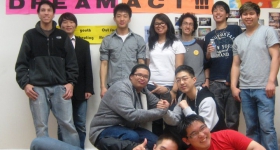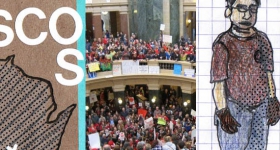Ok. Maybe we're a little on the average side. Somewhat innocuous.
Middle-of-the-road.... So maybe it's not that fulfilling serving as
cultural emissaries on our campuses, celebrating our heritages with
food festivals (while forgetting that many of us have hungry relatives
across the ocean) -- still, it's an important thing to do. Maybe it's a
little frustrating when we intern with national nonprofits that are
completely disconnected from our communities, and have to turn a blind
eye when they regard the rest of the world with that trademark American
paternalism -- but you have to pick your battles, right? Maybe we
overlook our mother countries when we're campaigning for women's
rights, but who can blame us? From what we remember, it's way backwards
over there, anyway.
In short, we are doing incredible things.
Incredibly mundane things. That don't do justice to the capacity of our
gifts, or hearts. We could be doing more, faster, better, and with a
critically analytical eye worthy of our superhuman cognitive abilities.
As Asian American activists we are uniquely positioned to leverage our
American privilege and nurtured assets in the service of the people and
places that our parents left decades ago in an efforts to make a better
life for us now. And why shouldn't we? The new activism is a
transnational activism. The battleground is the global economy. The big
bad villains of today are economic imperialism, neoliberalism,
transborder exploitation in all of its forms (not to mention the
age-old villains who persist even as new ones evolve). Who better than
us to lead the charge?
And who better than Hyphen to compile a
handbook for just such activists? As a progressive nonprofit ourselves,
it's about time we had a column on activism, an in-depth primer on
do-gooding. So, we've come up with "Idealize This!" -- a twice-monthly
(though sometimes more frequent) Hyphen blog column aimed at
challenging and/or exciting the ideals that fuel your (in)action.
Of
course, being the overachievers that we are, don't expect anything too
facile. (You're too smart for that simple shit, anyway). Rather, expect
us to problematize popular solutions to social change, critically
analyze well-intentioned acts of solidarity, and pragmatically evaluate
the played-out strategies muddling your little activist toolkit. We'd
also, of course, like to recognize exceptional Asian American
(especially transnational) activists who are using their powers for
good rather than mediocrity.
That said, we'd love to hear your
thoughts on all of this, so we invite you to use this post as a forum
to comment on what's wrong (and right) with activism in our
communities, as well as leave story suggestions, constructive
criticisms, and other helpful tidbits.
In the
meantime...here's a taste of things to come -- a few ideas in the
hopper that will more than likely make it into the column soon enough
(and will, hopefully, inspire you to send in some suggestions!):
- Fil-ams and Filipinas: the place (if there is one) of American identity politics in transnational activism
- Fair Trade can change the world?: Power dynamics and real outcomes in the Fair Trade movement
- Where is the women's movement today? In the Third World!
- Asians are creative. But is art really activism?
- Problematizing transnational adoption, or Rich White Lady Activism
See you shortly!










Comments